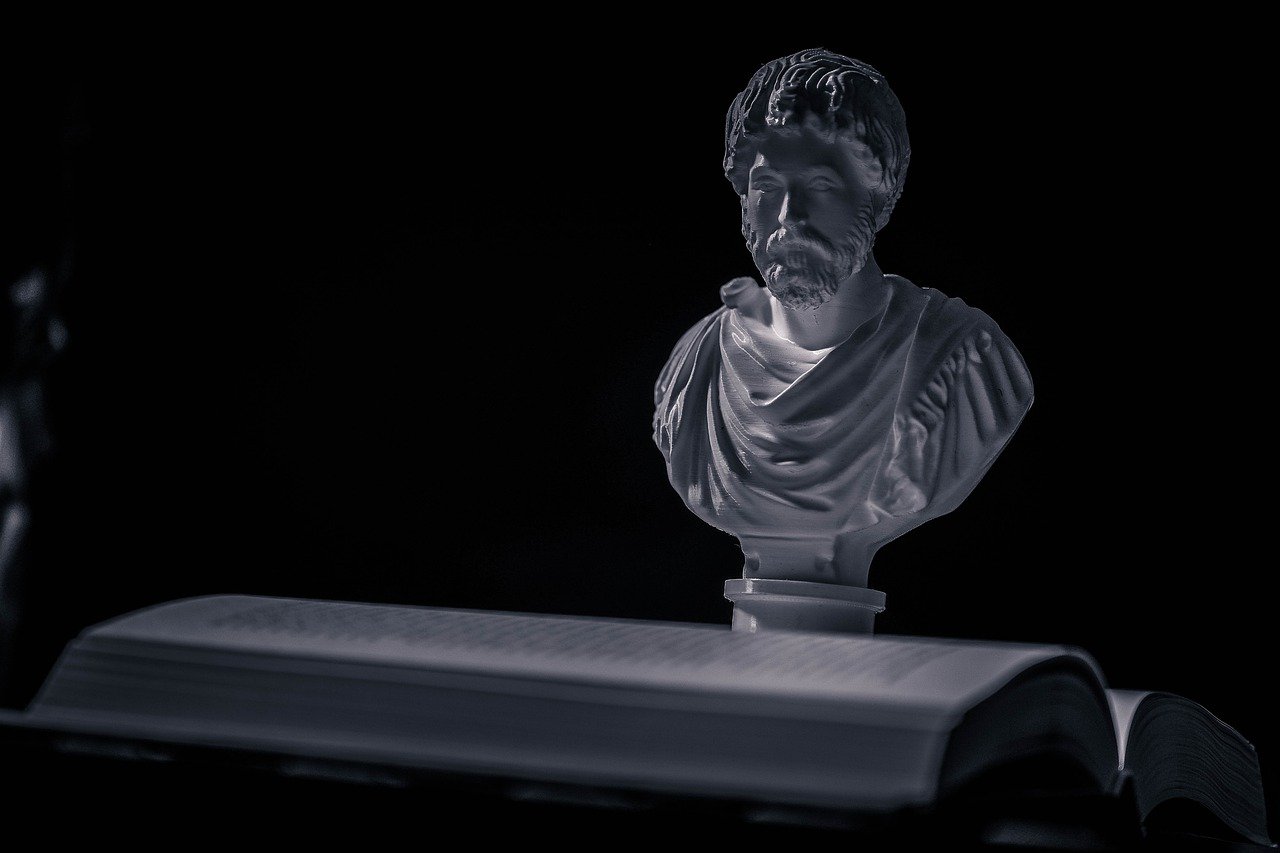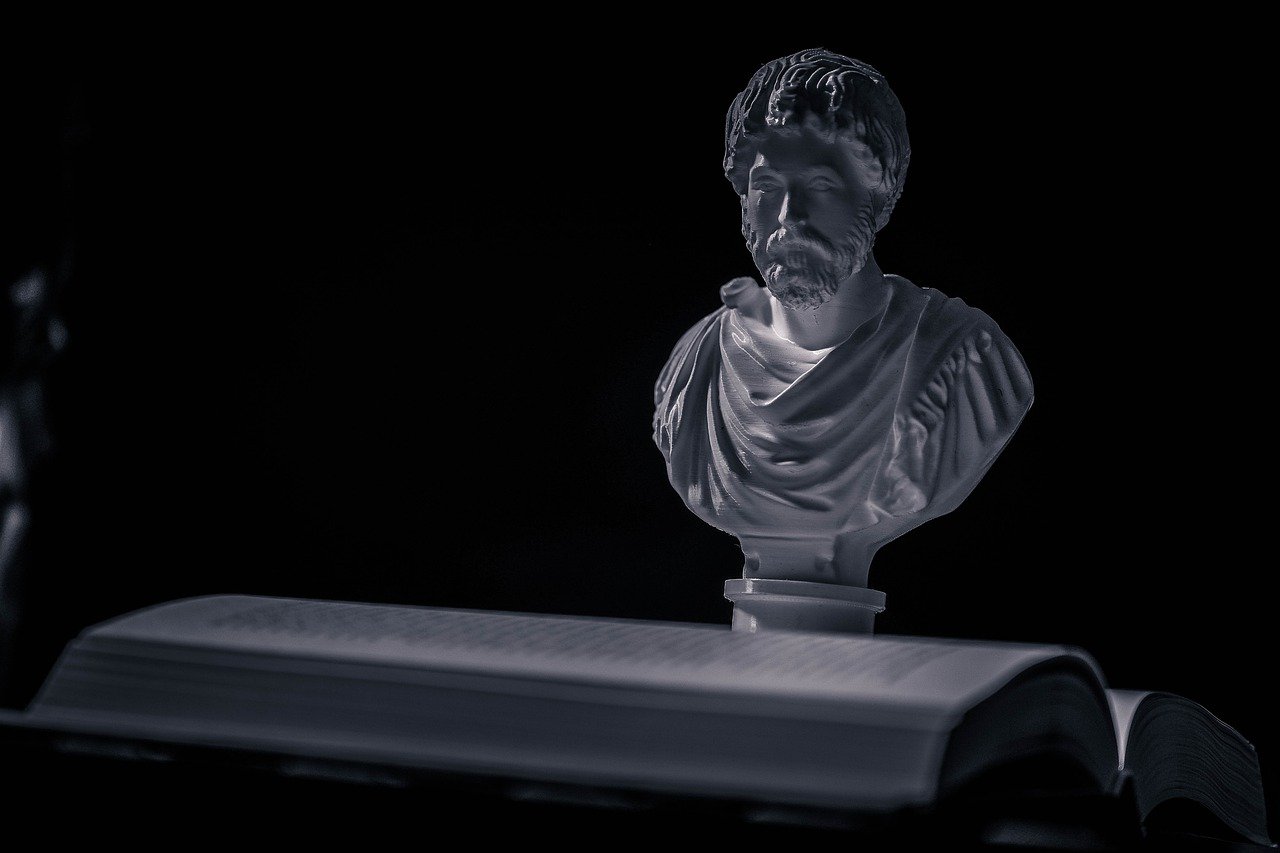What Were Zeno of Citium's Teachings on Stoicism?
Zeno of Citium, the brilliant mind behind Stoicism, revolutionized the way we think about ethics and personal conduct. Imagine living in a world where your happiness doesn't hinge on external circumstances but rather on your own virtue and reasoning. That's the essence of Stoicism! Zeno's teachings encourage us to cultivate an inner strength that helps us navigate life's ups and downs with grace and resilience. In this article, we will explore the foundational principles that Zeno established, which continue to resonate with us today, guiding us towards a more fulfilling and meaningful life.
At the core of Zeno's philosophy is the idea that **virtue is the highest good**. This means that regardless of what happens around us, our character and moral integrity are what truly matter. Zeno believed that by focusing on virtue, we can achieve a state of tranquility and happiness that is independent of external factors. He emphasized the importance of living in accordance with nature, which means aligning our actions with the rational order of the universe. This perspective encourages us to embrace our role in the grand scheme of things, promoting a sense of belonging and purpose.
But what does it mean to live virtuously? Zeno identified four cardinal virtues that serve as guiding principles: **wisdom, courage, justice, and temperance**. Each of these virtues plays a crucial role in shaping our character and decision-making processes. For instance, wisdom helps us discern right from wrong, courage empowers us to face challenges head-on, justice ensures fairness in our interactions, and temperance encourages self-control. By cultivating these virtues, we can navigate life's complexities with confidence and integrity.
Another key aspect of Zeno's teachings is the **importance of reason**. He posited that reason is the tool that allows us to make informed choices and respond to life's challenges with clarity. In a world filled with distractions and emotional turmoil, Zeno's emphasis on rational thought serves as a beacon of hope. It reminds us that we have the power to control our reactions and maintain our composure, even in the face of adversity. Zeno's insights into emotional resilience teach us that it's not the events themselves that disturb us, but rather our perceptions and judgments about those events.
As we delve deeper into Zeno's teachings, we find that they are not just theoretical concepts; they have practical applications in our daily lives. For example, when faced with a difficult situation, a Stoic approach would involve stepping back, assessing the situation rationally, and responding thoughtfully rather than reactively. This practice can lead to better decision-making and personal growth, fostering a sense of empowerment and control.
In summary, Zeno of Citium's teachings on Stoicism offer a profound framework for living a virtuous and fulfilling life. By focusing on virtue, embracing reason, and aligning ourselves with the natural order, we can cultivate emotional resilience and navigate life's challenges with grace. Zeno's legacy continues to inspire individuals seeking a deeper understanding of themselves and their place in the world.
- What is Stoicism? Stoicism is an ancient Greek philosophy that teaches the development of self-control and fortitude as a means to overcome destructive emotions.
- Who was Zeno of Citium? Zeno of Citium was a philosopher from Cyprus who founded the Stoic school of philosophy in Athens in the early 3rd century BC.
- What are the main teachings of Stoicism? The main teachings include the importance of virtue, living in accordance with nature, and the role of reason in achieving a good life.
- How can Stoicism be applied in modern life? Stoicism can be applied through practices such as mindfulness, rational decision-making, and focusing on what is within our control.

The Life of Zeno of Citium
Zeno of Citium, the founder of Stoicism, had a life story that is as intriguing as his philosophical teachings. Born around 334 BCE in Citium, a coastal city in Cyprus, Zeno hailed from a wealthy merchant family. However, his journey into philosophy began not in the lap of luxury but rather through a series of unexpected events that would shape his thoughts and beliefs. After losing his fortune in a shipwreck, Zeno found himself in Athens, a city brimming with intellectual vigor. It was here that he encountered the works of Socrates and the Cynics, which deeply influenced his philosophical outlook.
In Athens, Zeno was captivated by the idea of living a life of virtue and wisdom, leading him to study under various philosophers. He initially learned from Crates of Thebes, a prominent Cynic philosopher, who encouraged him to embrace a life of simplicity and self-control. This mentorship was pivotal, as it laid the groundwork for Zeno's own philosophical system. After years of study, Zeno eventually established his own school, the Stoa Poikile, or "Painted Porch," where he began to articulate his thoughts on ethics, logic, and natural philosophy.
His teachings attracted a diverse group of followers, ranging from wealthy citizens to slaves, all drawn by the promise of a life guided by reason and virtue. Zeno's emphasis on the importance of community and the shared human experience was revolutionary at the time. He believed that philosophy should not only be an academic pursuit but a practical guide to living well. Through his dialogues and teachings, Zeno sought to empower individuals to take control of their lives and find peace amidst the chaos of the world.
Despite facing criticism and challenges, Zeno remained steadfast in his beliefs. His dedication to philosophy was unwavering, and he continued to teach until his death around 262 BCE. Zeno's legacy endured long after his passing, influencing generations of thinkers and establishing Stoicism as one of the most significant schools of thought in Western philosophy. Today, his insights into human nature, ethics, and the pursuit of happiness continue to resonate, proving that the wisdom of Zeno of Citium is as relevant now as it was in ancient times.

Core Principles of Stoicism
At the heart of Stoicism lies a collection of core principles that serve as guiding lights for ethical living. These principles are not just abstract ideas; they are practical tools that help individuals navigate the complexities of life with grace and resilience. One of the most essential teachings of Zeno of Citium, the founder of Stoicism, is that true happiness and fulfillment come from within, rather than from external circumstances. This perspective invites us to shift our focus from the chaos of the outside world to the serenity of our inner selves.
Central to Stoic thought is the idea of virtue, which Zeno posited as the highest good. But what does this really mean? In essence, virtue encompasses the qualities that enable us to live a good life, aligning our actions with our values. Zeno believed that by cultivating virtue, we can achieve a state of tranquility, regardless of our external situation. This leads us to the understanding that happiness is not contingent upon wealth, fame, or other external goods, but rather on our character and choices.
Another vital principle of Stoicism is the emphasis on reason. Zeno taught that our ability to think critically and rationally is what sets us apart from other beings. By employing reason, we can make decisions that align with our values and virtues rather than being swayed by fleeting emotions or societal pressures. This rational approach encourages us to reflect on our thoughts and actions, promoting a sense of self-awareness that is crucial for personal growth.
Furthermore, Zeno's teachings highlight the importance of living in accordance with nature. This concept is multifaceted, encompassing both our natural environment and our intrinsic human nature. Living in harmony with nature means recognizing our place within the larger cosmos and understanding that we are part of a greater whole. It invites us to embrace the natural order of things, accepting what we cannot control while focusing on our responses to life's challenges.
To summarize the core principles of Stoicism, we can identify the following key concepts:
- Virtue: The highest good and the foundation of a fulfilling life.
- Reason: The guiding force for decision-making and emotional regulation.
- Living in Accordance with Nature: Aligning our actions with the natural order and our true selves.
These principles create a robust framework for navigating life's ups and downs. They encourage us to cultivate a mindset that prioritizes personal growth and ethical living. By embracing these teachings, we can learn to face adversity with strength and maintain our inner peace, much like a sturdy tree that bends but does not break in a storm.

The Concept of Virtue
The concept of virtue is at the very heart of Zeno of Citium's teachings on Stoicism. For Zeno, virtue was not just a lofty ideal; it represented the highest good and the ultimate goal of human life. Imagine virtue as a compass that guides us through the tumultuous seas of existence, helping us navigate the storms of life's challenges while steering clear of the treacherous rocks of vice. In Stoicism, virtue is synonymous with living a life of moral excellence, where our actions align with reason and nature.
To fully grasp the significance of virtue in Stoicism, one must understand that Zeno viewed it as a state of being rather than a mere collection of good deeds. It’s about embodying qualities that reflect our highest potential and allowing those qualities to shine through in our interactions with others. A Stoic individual strives to cultivate virtues that not only enhance personal character but also contribute positively to society. In this sense, virtue is both a personal journey and a social responsibility.
Furthermore, Zeno identified four cardinal virtues that serve as the pillars of a virtuous life:
- Wisdom: The ability to discern what is truly valuable and to make sound judgments based on knowledge and experience.
- Courage: The strength to face challenges and adversities with confidence and resolve, standing firm in the face of fear.
- Justice: The commitment to fairness and the well-being of others, ensuring that our actions contribute to a just society.
- Temperance: The practice of self-control and moderation in all aspects of life, avoiding excess and embracing balance.
These virtues are interrelated, creating a holistic framework for ethical living. For instance, exercising wisdom often requires courage, while justice can only be achieved through temperance. Zeno believed that by cultivating these virtues, individuals could lead fulfilling lives, regardless of their external circumstances.
Moreover, Zeno emphasized that virtue alone is sufficient for happiness. This idea stands in stark contrast to the common belief that external goods—such as wealth, health, or social status—are necessary for a happy life. According to Zeno, these external factors are fleeting and often beyond our control. Instead, true happiness arises from within, rooted in the cultivation of virtue. Imagine a garden: it flourishes not because of the decorations around it but because of the care and attention given to its growth. Similarly, a virtuous life nurtures inner peace and contentment, independent of external validation.
In summary, the concept of virtue in Zeno's Stoicism is not merely a philosophical abstraction; it is a practical guide for living a meaningful life. By focusing on cultivating wisdom, courage, justice, and temperance, individuals can navigate the complexities of life with integrity and purpose. As we reflect on Zeno's teachings, we are reminded that the journey toward virtue is ongoing, requiring continuous effort and self-reflection.
- What is the main focus of Zeno's teachings on virtue?
Zeno's teachings emphasize that virtue is the highest good and essential for achieving true happiness. - How many cardinal virtues did Zeno identify?
Zeno identified four cardinal virtues: wisdom, courage, justice, and temperance. - Can external goods lead to happiness according to Zeno?
No, Zeno believed that true happiness comes from within and is rooted in virtue, not external possessions. - How can someone practice the virtues taught by Zeno?
By actively cultivating these virtues in daily life through self-reflection, decision-making, and interpersonal relationships.

Types of Virtue
The concept of virtue stands as a towering pillar in the philosophy of Stoicism, and Zeno of Citium meticulously defined it through four cardinal virtues that serve as the bedrock for ethical living. These virtues—wisdom, courage, justice, and temperance—are not just lofty ideals; they are practical guides that can illuminate our daily choices and actions. Imagine navigating through life with a compass that always points toward moral clarity; that's what these virtues provide.
Let’s break down each of these virtues and see how they can be applied in our everyday lives. First, we have wisdom, which is often seen as the ability to discern what is true and what is false. It's like having a pair of glasses that help you see the world more clearly, allowing you to make decisions that align with your values. Wisdom encourages us to seek knowledge, reflect on our experiences, and apply what we learn to improve our lives and the lives of those around us.
Next is courage, which is not merely about physical bravery but encompasses the strength to face adversity and make difficult choices. Think of it as the inner fire that propels you to step out of your comfort zone, whether that means standing up for what you believe in or confronting your own fears. Zeno believed that true courage is essential for living a virtuous life, as it empowers individuals to act rightly, even in the face of challenges.
Then we have justice, which is about fairness and treating others with respect. In a world that often feels chaotic and unjust, this virtue serves as a reminder of our responsibility to our communities and the people around us. Justice is more than just a social contract; it’s about fostering relationships built on trust and integrity. It’s the principle that guides us to act not just for ourselves but for the greater good.
Lastly, temperance embodies self-control and moderation. It’s the art of finding balance in all aspects of life, whether it’s in our desires, emotions, or actions. Imagine a tightrope walker; they must maintain their balance to avoid falling. Similarly, temperance teaches us to manage our impulses and desires, ensuring that we do not let excess lead us astray. Zeno argued that a temperate person can enjoy life’s pleasures without becoming a slave to them.
In summary, these four cardinal virtues are interconnected and reinforce one another. They are not merely abstract concepts but practical tools that can guide us in our quest for a fulfilling and ethical life. By embodying wisdom, courage, justice, and temperance, we can navigate the complexities of life with a clear moral compass, helping us to become not just better individuals but also contributing members of society.

Virtue vs. External Goods
Zeno of Citium firmly believed that virtue is the only true path to happiness, a notion that sets Stoicism apart from many other philosophical schools. He argued that external goods, such as wealth, health, and social status, are not only unreliable but also insufficient for achieving genuine fulfillment. Imagine trying to fill a bucket with holes—no matter how much water you pour in, it will never stay full. This metaphor illustrates how external possessions can never truly satisfy our inner desires or lead to lasting happiness.
In Stoic thought, the pursuit of external goods is often seen as a distraction from the cultivation of virtue. Zeno emphasized that while these goods might provide temporary pleasure, they are ultimately outside our control. For instance, you could be the wealthiest person in the room, but if you lack wisdom or courage, what does that wealth truly mean? This perspective challenges us to reevaluate our priorities and consider what it means to live a good life.
To further understand Zeno's stance, let’s look at the distinctions he made between virtue and external goods:
| Aspect | Virtue | External Goods |
|---|---|---|
| Nature | Internal and stable | External and unstable |
| Source of Happiness | Inherent | Conditional |
| Control | Fully within our control | Partially outside our control |
| Longevity | Eternal | Temporary |
In essence, Zeno taught that the pursuit of virtue is like planting seeds in fertile soil—while it requires effort and dedication, it ultimately yields a harvest of true contentment and peace. On the other hand, chasing after external goods can be likened to chasing shadows; they may seem appealing, but they are fleeting and often elusive. This realization invites us to shift our focus from what we cannot control to what we can—our thoughts, actions, and character.
Moreover, Zeno's teachings encourage us to cultivate resilience in the face of life's uncertainties. By recognizing that external goods come and go, we learn to find stability in our virtues, which remain steadfast regardless of our circumstances. This Stoic approach not only fosters a sense of inner strength but also equips us to navigate life's challenges with grace and composure.
In conclusion, Zeno of Citium's teachings on virtue versus external goods challenge us to rethink our values. By prioritizing virtue over the transient allure of material possessions, we can craft a life that is rich in meaning and fulfillment. So, the next time you're tempted to chase after the latest trend or material possession, remember Zeno's wisdom: true happiness lies not in what we have, but in who we are.
- What is the main idea of Zeno's philosophy? Zeno's philosophy centers around the belief that virtue is the only true good and that external goods do not contribute to genuine happiness.
- How do Stoics view external goods? Stoics believe that external goods are unreliable and should not be the focus of our happiness; instead, we should cultivate virtue.
- Can external goods lead to happiness? While they may provide temporary pleasure, external goods are ultimately insufficient for lasting happiness, according to Stoic philosophy.
- What should I focus on for a fulfilling life? Focus on developing your virtues, such as wisdom, courage, justice, and temperance, as these are the keys to a fulfilling and meaningful life.

Living in Accordance with Nature
One of the most profound teachings of Zeno of Citium revolves around the concept of . But what does that really mean? Imagine for a moment that you are a river flowing through a landscape. Your path is determined not by your desires, but by the terrain around you. In Stoicism, this metaphor beautifully encapsulates the idea that our lives should align with the natural order of the universe. Zeno believed that understanding the natural world and our place within it is essential for achieving a harmonious life.
To live in accordance with nature is to embrace the idea that everything happens for a reason. It’s about recognizing that the universe operates on its own principles, and as human beings, we are a part of this grand tapestry. Zeno taught that by observing the world around us and understanding its laws, we can learn to navigate our lives more effectively. This perspective encourages individuals to accept circumstances beyond their control and focus on their reactions to those events instead. In essence, it’s about finding peace in the chaos of life.
Furthermore, Zeno argued that nature is rational and that humans, being rational creatures, should strive to act in accordance with this rationality. This leads to a deeper understanding of our own emotions and desires. When we align our actions with nature’s rational order, we cultivate a sense of inner peace and tranquility. The Stoics believed that by practicing this alignment, we can achieve a state of eudaimonia, or flourishing, which is the ultimate goal of life.
Now, how can we apply this principle in our daily lives? Here are a few practical ways:
- Mindfulness: Take time to observe your thoughts and feelings without judgment. This awareness helps you understand your natural responses to situations.
- Acceptance: Embrace the things you cannot change. Instead of fighting against the current, learn to flow with it.
- Nature Connection: Spend time outdoors. Engage with the natural world to remind yourself of the larger forces at play.
In conclusion, living in accordance with nature is not just a philosophical idea; it is a practical guide to living a fulfilling and harmonious life. By embracing this Stoic principle, we can cultivate resilience and peace, no matter what challenges life throws our way. Zeno's teachings remind us that we are not separate from nature, but rather an integral part of it, and understanding this connection can lead to a more meaningful existence.
- What does it mean to live in accordance with nature? It means aligning your actions and thoughts with the natural order of the universe, accepting what you cannot change, and finding peace within that understanding.
- How can I practice living in accordance with nature? You can practice mindfulness, acceptance, and connecting with nature to better align your life with the natural world.
- Why is this principle important in Stoicism? It helps cultivate emotional resilience and inner peace, guiding individuals toward a fulfilling life despite external circumstances.

The Role of Reason in Stoicism
When you think about Stoicism, the first thing that might come to mind is the idea of being tough or emotionless. But that's not quite the whole story. At the heart of Stoic philosophy lies a powerful concept: reason. Zeno of Citium, the founder of Stoicism, believed that reason is the guiding force that helps us navigate the complexities of life. Imagine reason as a compass, always pointing us in the right direction, even when the seas of life get stormy.
In Stoicism, reason is more than just logic; it's about understanding the world and our place in it. Zeno taught that by using reason, we can discern what is truly important and what is merely a distraction. This approach encourages us to focus on our internal world—our thoughts, beliefs, and actions—rather than getting swept away by external circumstances. Think of it like being on a roller coaster: while everyone around you might be screaming and panicking, you can choose to stay calm and collected, thanks to the power of your rational mind.
One of the most fascinating aspects of Zeno's teachings is how he linked reason to emotional resilience. He argued that our emotions often stem from our judgments about events rather than the events themselves. For instance, if you face a setback at work, it's not the setback that causes distress but rather your interpretation of it. By applying reason, we can reframe our thoughts and respond to challenges with a sense of calm and clarity. This practice becomes essential for maintaining tranquility in the face of adversity.
To illustrate this point, let’s break down the role of reason in Stoicism into a few key areas:
- Decision-Making: Reason helps us weigh our options and make choices aligned with our values and virtues.
- Emotional Management: By understanding the roots of our emotions, we can better control our reactions and maintain composure.
- Personal Growth: Reason encourages self-reflection and critical thinking, which are vital for personal development.
Furthermore, Zeno emphasized that reason should be used to evaluate our desires and aversions. In Stoicism, we learn to distinguish between what is within our control and what is not. This distinction is crucial because it allows us to focus our energy on the things we can change, rather than wasting time and effort on what we cannot. It's akin to tending to a garden: you wouldn't spend your time worrying about the weather; instead, you would cultivate the plants you can control.
Ultimately, the Stoic practice of reason leads to a more fulfilling life. By aligning our thoughts and actions with rational principles, we can achieve a sense of inner peace and resilience. Zeno's teachings remind us that while we cannot always control our circumstances, we can control our responses to them. This ability to respond thoughtfully rather than react impulsively is what sets Stoics apart, allowing them to navigate life's ups and downs with grace and dignity.
- What is the main role of reason in Stoicism? Reason serves as the guiding force for decision-making, emotional management, and personal growth, helping individuals align their actions with their values.
- How can I apply Stoic reasoning in my daily life? You can practice Stoic reasoning by reflecting on your thoughts and reactions, focusing on what you can control, and using logic to navigate challenges.
- Is Stoicism about suppressing emotions? No, Stoicism is not about suppressing emotions but about understanding and managing them through rational thought.

Emotional Resilience
When we talk about , we're diving into one of the most fascinating aspects of Zeno of Citium's teachings. Think of it as your mental armor, helping you withstand the storms of life. Zeno believed that cultivating emotional resilience was essential for anyone striving to live a virtuous life. But what does that really mean? Well, it’s all about how we respond to challenges and setbacks. Instead of letting emotions control us, Stoicism teaches us to manage them effectively, allowing us to maintain our inner peace.
Imagine you're sailing on a vast ocean. The waves represent life's challenges—sometimes calm, sometimes tumultuous. Emotional resilience is your sturdy ship, equipped to navigate through both serene and stormy seas. Zeno emphasized that while we can't control external events, we can control our reactions to them. This is where the concept of reason comes into play. By applying reason, we learn to analyze our emotions and choose our responses wisely, rather than impulsively reacting.
One practical technique that Zeno and his followers advocated for was the practice of negative visualization. This involves contemplating the worst-case scenarios in a given situation. It might sound a bit gloomy, but the idea is to prepare yourself mentally for potential difficulties. By doing this, you can reduce the shock of adverse events when they occur, making it easier to maintain your composure. For instance, before a big presentation, a Stoic might visualize the possibility of forgetting their lines or facing tough questions. This mental rehearsal can help them remain calm and collected if the unexpected happens.
Another key aspect of emotional resilience in Stoicism is the understanding of impermanence. Zeno taught that everything in life is transient, including our emotions. By recognizing that feelings are temporary and often influenced by external factors, we can distance ourselves from overwhelming emotional responses. This perspective allows us to step back, assess the situation, and respond from a place of clarity rather than chaos.
To further illustrate how Zeno's teachings can be applied in daily life, consider the following table that summarizes practical strategies for building emotional resilience:
| Strategy | Description |
|---|---|
| Negative Visualization | Prepare for potential challenges by imagining worst-case scenarios. |
| Practice Mindfulness | Stay present and aware of your thoughts and feelings without judgment. |
| Reflect on Impermanence | Recognize that all emotions are temporary and will pass. |
| Engage in Self-Dialogue | Challenge negative thoughts by questioning their validity and seeking rational responses. |
Incorporating these strategies into your daily routine can significantly enhance your emotional resilience. It’s like building a muscle; the more you practice, the stronger you become. Remember, the goal isn't to eliminate emotions but to understand and manage them effectively. By doing so, you’ll find yourself better equipped to handle life's ups and downs with grace and composure.
In conclusion, Zeno of Citium’s teachings on emotional resilience remind us that while we may not have control over external circumstances, we do have the power to shape our internal responses. By embracing reason, practicing mindfulness, and reflecting on the transient nature of emotions, we can cultivate a profound sense of peace and stability in our lives. So, the next time you face a challenge, remember to harness your emotional resilience—your ship is ready to sail!
- What is emotional resilience? Emotional resilience is the ability to adapt to stressful situations and bounce back from adversity.
- How can Stoicism help with emotional resilience? Stoicism teaches individuals to manage their emotions through reason, preparing for challenges, and accepting the impermanence of feelings.
- What are some practical techniques for building emotional resilience? Techniques include negative visualization, mindfulness practices, and engaging in self-dialogue to challenge negative thoughts.
- Is emotional resilience the same as emotional suppression? No, emotional resilience involves understanding and managing emotions, not suppressing them.

Practical Applications of Reason
When we talk about the in Stoicism, we're diving into a treasure trove of techniques that can transform our daily lives. Imagine waking up each day with a clear mind, ready to tackle whatever challenges come your way. That's the power of reason! Zeno of Citium emphasized that reason isn't just a tool for intellectual pursuits; it's a guiding light that helps us navigate the tumultuous waters of life. By applying reason, we can make better decisions, manage our emotions, and ultimately, lead a more fulfilling life.
One of the first steps in applying reason is to practice self-reflection. This involves taking the time to assess our thoughts and feelings. For instance, when faced with a stressful situation, instead of reacting impulsively, we can pause and ask ourselves questions like, "What can I learn from this?" or "Is my reaction based on facts or emotions?" This kind of reflective thinking allows us to distance ourselves from immediate emotional responses and consider a more rational approach.
Another vital application of reason is the concept of premeditatio malorum, or the premeditation of evils. This Stoic practice involves envisioning potential challenges or setbacks before they happen. By mentally preparing for difficulties, we can reduce their emotional impact when they arise. For example, if you’re anxious about an upcoming presentation, take a moment to imagine the worst-case scenario. What if it doesn't go well? By contemplating this, you can devise strategies to handle it calmly, reinforcing your resilience.
Moreover, Zeno taught that understanding the nature of things is crucial for applying reason effectively. This means recognizing what is within our control and what is not. A practical exercise is to create a simple
| Within My Control | Outside My Control |
|---|---|
| My thoughts and actions | Other people's opinions |
| My responses to events | Natural disasters |
| My effort and preparation | Results of my efforts |
This table serves as a visual reminder to focus our energy on what we can influence, rather than wasting time worrying about external factors that are beyond our reach. By practicing this, we cultivate a sense of empowerment and clarity in our daily lives.
Additionally, engaging in thought experiments can be a powerful way to apply reason. Imagine you're faced with a tough decision—should you take that new job or stay in your current position? You can weigh the pros and cons, envisioning how each choice aligns with your values and long-term goals. This method not only clarifies your thinking but also helps you align your actions with your Stoic principles.
Finally, let’s not underestimate the importance of community and dialogue. Engaging with others who share Stoic values can provide fresh perspectives and insights. Discussing philosophical ideas with friends or through online forums can challenge your thinking and help refine your reasoning skills. Remember, reason flourishes in a collaborative environment where diverse thoughts are encouraged.
In summary, the practical applications of reason in Stoicism are not just theoretical concepts; they are actionable strategies that can enhance our daily lives. From self-reflection to premeditation, understanding what we can control, and engaging in thoughtful dialogue, each of these practices helps us cultivate a life of virtue and tranquility. So, why not give them a try? You might just find that the path to a more rational and fulfilling life is clearer than you ever imagined!
- What is the main goal of practicing reason in Stoicism? The main goal is to achieve a virtuous life by making informed decisions and managing emotions effectively.
- How can I start applying Stoic principles in my daily life? Begin with self-reflection and focus on what you can control, while practicing premeditatio malorum to prepare for potential challenges.
- Is reason the only important aspect of Stoicism? While reason is crucial, Stoicism also emphasizes virtue, emotional resilience, and living in accordance with nature.

Influence on Later Philosophers
Zeno of Citium's teachings on Stoicism were not just a fleeting moment in the history of philosophy; they were the bedrock upon which later thinkers built their own ideas. Imagine a tree with deep roots; Zeno's foundational concepts spread out and flourished into various branches of Stoic thought. His influence is palpable in the works of notable philosophers such as Seneca, Epictetus, and Marcus Aurelius, who each interpreted and expanded upon Zeno's original ideas in their unique ways.
Seneca, for instance, was a Roman statesman and playwright who integrated Stoicism into the fabric of his moral essays and letters. He emphasized the importance of practical wisdom and how it could be applied to everyday life. His writings, filled with personal anecdotes and reflections, show how Zeno's teachings on virtue and emotional resilience shaped his thoughts. Seneca famously stated, "We suffer more often in imagination than in reality," a sentiment echoing Zeno's emphasis on the power of reason over emotions.
Then there's Epictetus, a former slave who became one of the most influential Stoic philosophers. His teachings focused on the idea that while we cannot control external events, we can control our responses to them. This aligns perfectly with Zeno's assertion that understanding and aligning with nature leads to a harmonious life. Epictetus's concept of inner freedom is a direct reflection of Zeno's belief in the importance of virtue and reason, showing how these ideas can empower individuals to lead fulfilling lives despite external circumstances.
Marcus Aurelius, the Roman Emperor and philosopher, took Zeno's teachings to heart in his personal reflections. His work, "Meditations," is a treasure trove of Stoic wisdom, where he writes about the significance of virtue, the fleeting nature of life, and the importance of rational thought. For Marcus, Zeno's teachings were not just theoretical; they were a practical guide for navigating the complexities of leadership and personal integrity. He often reminded himself to focus on what is within his control, echoing Zeno's core belief in the power of reason and virtue.
The ripple effect of Zeno's philosophy can also be seen in the broader context of Western philosophy. His ideas contributed significantly to the development of ethical theories, influencing not only Stoicism but also early Christian thought and later Enlightenment thinkers. The Stoic emphasis on virtue as the highest good resonated with many, leading to a rich dialogue between Stoicism and other philosophical traditions.
In summary, Zeno of Citium laid the groundwork for a philosophical movement that would endure for centuries. His teachings on virtue, reason, and emotional resilience have been woven into the fabric of later philosophical discourse, proving that the essence of his thought remains relevant even today. The legacy of Zeno is not just in the ideas he presented, but in the way those ideas have inspired countless individuals to pursue a life of virtue and wisdom.
- What is Stoicism? Stoicism is an ancient Greek philosophy that teaches the development of self-control and fortitude as a means to overcome destructive emotions.
- Who was Zeno of Citium? Zeno of Citium was a Greek philosopher who founded the Stoic school of philosophy in Athens around 300 BC.
- How did Zeno influence later philosophers? Zeno's teachings laid the foundation for later Stoics like Seneca, Epictetus, and Marcus Aurelius, who expanded on his ideas about virtue and reason.
- What are the core principles of Stoicism? The core principles include virtue, reason, and living in accordance with nature.
Frequently Asked Questions
- What is Stoicism?
Stoicism is an ancient Greek philosophy founded by Zeno of Citium that teaches the development of self-control and fortitude as a means to overcome destructive emotions. It emphasizes rationality and living in harmony with nature.
- Who was Zeno of Citium?
Zeno of Citium was a philosopher from Cyprus who founded the Stoic school of philosophy around 300 BC in Athens. His teachings focused on ethics, virtue, and the importance of reason in achieving a good life.
- What are the core principles of Stoicism?
The core principles of Stoicism include virtue as the highest good, the importance of reason, and the belief in living in accordance with nature. Stoics believe that by cultivating virtue, one can achieve true happiness.
- What are the four cardinal virtues in Stoicism?
Zeno identified four cardinal virtues: wisdom, courage, justice, and temperance. These virtues serve as a guide for ethical living and personal development in the Stoic tradition.
- How does Stoicism view external goods?
Stoicism teaches that external goods, such as wealth and reputation, are not necessary for happiness. Instead, virtue alone is sufficient for a fulfilling life, as it is within our control.
- What does it mean to live in accordance with nature?
Living in accordance with nature means understanding the natural order of the universe and aligning one's life with it. Stoics believe that this alignment leads to a more harmonious and fulfilling existence.
- How does reason play a role in Stoicism?
Reason is central to Stoic philosophy. It guides decision-making and helps individuals manage their emotions, allowing them to respond to challenges with clarity and composure.
- What techniques do Stoics use for emotional resilience?
Stoics employ various techniques for emotional resilience, such as negative visualization, reframing situations, and focusing on what is within their control. These practices help maintain tranquility in the face of adversity.
- How can I apply Stoic principles in my daily life?
You can apply Stoic principles by practicing mindfulness, reflecting on your values, and making conscious choices that align with your virtues. Start small, and gradually incorporate Stoic practices into your routine.
- What influence did Zeno have on later philosophers?
Zeno's teachings significantly influenced later Stoics like Seneca and Epictetus. His ideas laid the groundwork for their philosophies, which further developed Stoic thought and its applications in life.



















